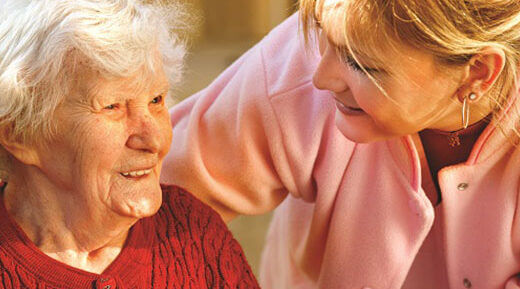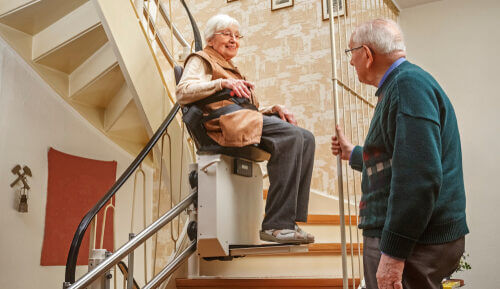Starting home care is a big step in anyone’s life. You’ll soon reap the benefits of the extra care and support you’ll receive. People seek home care for a number of different reasons. They may be elderly, disabled, have medical needs or have mental health problems. When you start receiving home care, life will be a little different.

Page contents
Once you have had your care needs assessment and have decided on your budget, the home care team or agency will discuss with you what times of the day you’d like support and any adjustments to your home that may be needed to enable care workers to help you.
Home adaptations
Your needs assessment may highlight that you would benefit from adaptations to your home that will help you to be safer and have more independence. These adaptations could include handrails, a stairlift, a walk-in shower or even installing a lift.
You can find out more about home adaptations and about how they are funded.
Key safes
When you start home care, carers will need to be able to get in and out of your home securely. To do so, care workers often use a key safe. This is a small safe attached to the wall outside your front door, which requires a four-digit code to open.
A copy of your key will be kept in there so that care workers can come in without leaving the door unlocked all day, and in case of emergencies. These cost about £15 and someone can fit it to your wall for you fairly quickly. Just make sure the screws are in brick rather than mortar, or it may fall off.
Notes and paperwork
The layout of your home may change slightly to accommodate your home care. Care workers may keep written notes at your home. This is so that each care worker knows what has been done and what they need to do. These notes are checked regularly by management to ensure that you are receiving the best possible care.
They will keep these notes, along with your care plan and MAR sheet (where they record administering your medication), in a designated spot that everybody can find, such as a kitchen table or on top of a chest of drawers. It is important that you do not move these so that care workers can find them easily. You can decide where the designated notes spot is.
Some home care companies use digital notes, rather than paper.
Storage for medication and equipment
Care workers will also have a regular place for any equipment used for your care. These might be hoists and your medicine box. Medicine will usually be kept in a locked medicine box.
Living space for a live-in carer
If you have live-in care, you will need a bedroom specially for your care worker. They will discuss any changes they want to make with you, such as moving furniture or adding decoration.
As part of your household, they will probably have some of their things around your home too. They might put their wash things in the bathroom and their food in the fridge. You might assign them storage space, like a kitchen cupboard, a shelf in the fridge and their own laundry basket.
A busier home
Depending on the type of care you choose, you may have different people coming and going from your home throughout the day. This can be strange to get used to when you first start home care, but many people enjoy the bustle of a busy household and the regular company. Because you’ll know exactly what times to expect them, you don’t need to worry about privacy.
Rota of care workers
Each week you will be sent a rota of which care worker is coming when. A copy may also be sent to a loved one who is involved in your care. This rota may change week to week when people are on holiday or off sick, but most of the time you’ll have a regular routine of care workers who you can really get to know and bond with.
New care workers
You will always be notified if a new care worker that you haven’t seen before is going to come to your home. They will have a badge or ID card when they arrive so that you know they’re the right person.
When a new care worker is training, they often shadow a staff member for a few days. The office staff will always ask your permission before setting anyone to shadow.
Changes to your routine
In order to manage your care effectively, home care teams need to be organised and tidy. Home care is designed to fit around your life but you will get used to a regular routine. You may be receiving support to wash and dress at the same time every day and eating meals at regular times.
For getting out and about, you may have more opportunities for hobbies and socialising as care workers can drive you where you want to go and support you when there if you wish. They will usually need to know where you want to go and when, so that they can organise their other duties accordingly.
A tidier home
Many people choose to have support with housework as part of their care plan. This might include cooking, cleaning and laundry. Even if this is not part of your package, care workers will always tidy up after themselves.
Adherence to health and safety also means that care workers will make sure that floors are clear and accessible and that work surfaces and bathrooms are sanitary. If you receive personal care, they will have an area of your home where they keep a supply of disposable plastic gloves and hand sanitiser.
Care workers will also be happy to help you with arranging for maintenance work, such as calling a plumber for you, but will never handle payment without express permission and recording it in your notes. If a loved one handles your money, your care workers will always run transactions past them.
Find out the signs that an older person needs home care.
FAQs
What adjustments might be made to my home when I start receiving home care?
Depending on what equipment is required for your care, care workers may need to reorganise your home to some extent to ensure that they can safely deliver your care. They will involve you in this and ask your permission to make changes. They may also attach a key safe to the wall by your front door so that care workers can let themselves in without having to leave the door unlocked.
Will care workers need to keep any equipment or documents at my home?
Your care needs assessment may find that you require equipment such as a hoist or wheelchair. Care workers will need somewhere to keep these. They are also likely to keep a folder in your house that contains your care plan, MAR sheets to record the administering of medication and notes where care workers write what they’ve done during their visit. You can look at this folder if you want to.
Can I retain my privacy while receiving home care?
Care workers must have access to rooms and any belongings required to deliver your care. They also need to be able to go to the toilet if they need to. Apart from that, you can ask that they don’t go into certain rooms or cupboards in your home. You can discuss access during your care needs assessment and have privacy rules written into your care plan so that each care worker knows exactly where they can and can’t go.
Can home care workers help me to run my home?
Care workers are there to deliver care and support you in everyday life, so that can include housework. They can cook, clean and do your laundry, these chores will be written into the care plan in order to establish a routine and make sure all household tasks are done. They can also help with booking appointments, arranging services like a plumber or milkman, and going to the supermarket, bank or Post Office.

Find home care near you



